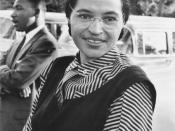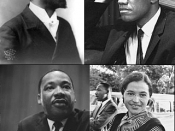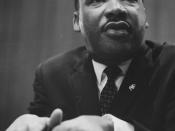The Montgomery bus boycott looms as a formative turning point of the twentieth century as it was the harbinger of the African American freedom movement, and the springboard for the leadership of Martin Luther King Jr. in civil rights, human rights and peacemaking. On December 1st, 1955 a forty-two year old black woman by the name of Rosa Parks boarded a bus in Montgomery, Alabama. Rosa sat in the first seat of the black section in the segregated bus. When the bus filled and the driver ordered her to move back so that a white man could take her place, she refused. Rosa Parks was arrested. This seemingly mundane event capped off decades of exploitation, segregation and abuse inflicted upon Montgomery's Negroes , and resulted in a boycott that would have monumental outcomes. The emergence of Martin Luther King and his subsequent articulation of principles of non-violence based on Christian theology, elevated his stature as a moral leader and consequently brought about the solidarity and determination of 50, 000 Negroes.
This formed the first significant opposition to white supremacy in the South, and was perhaps the most significant contribution of any activist to the civil rights movement.
Although precipitated by the arrest of Rosa Parks, the Montgomery Bus Boycott was actually a collective response to decades of intimidation, harassment and discrimination of Alabama's African American population. It is the opinion of Walton Hanes, that King's arrival in Montgomery coincided with the consequential enhanced unrest amongst the Negroes; his presence ultimately speeding the reaction that was catalysed by the arrest of Rosa Parks.
Subsequent to his arrival in Montgomery, by December of 1955 King was established as a preacher at the Dexter Avenue Baptist Church, but was unknown to the general public and to the Negroes of Montgomery. Following Park's arrest,



Good
that was a nice essay i enjoyed reading it
1 out of 1 people found this comment useful.